 web3.0
web3.0 Uniswap protocol fee allocation proposal detonates the market, what impact will it have on the future of DeFi?
Uniswap protocol fee allocation proposal detonates the market, what impact will it have on the future of DeFi?The emergence of the Uniswap protocol fee allocation proposal caused an uproar in the market and attracted the attention of many followers. This proposal may have a profound impact on the future development of the DeFi field and has aroused widespread heated discussion among industry insiders. In this article, PHP editor Strawberry will discuss in detail the specific content and potential impact of the proposal, as well as its significance and possible changes to the DeFi ecosystem.
On the evening of February 23, Uniswap Foundation Governance Leader (Gov Lead) Erin Koen launched a proposal to the Uniswap Governance Forum, proposing to use a fee mechanism to reward those UNI tokens that have entrusted and pledged their tokens. Coin holders. In the years since Uniswap announced its token airdrop in mid-to-late September 2020, there has been discussion about whether UNI should capture protocol fees to increase the utility of the token, but almost all has come to nothing. This proposal put forward by the head of the Uniswap Foundation formally places the utility of UNI tokens for discussion at the governance level, which has aroused the excitement of many holders and led to the emergence of UNI and other DeFi protocol representatives. The currency rises.
First of all, it needs to be clear that this proposal was proposed by a representative of the Uniswap Foundation, and the Uniswap Foundation is not equal to Uniswap Labs. Uniswap Labs is responsible for developing and maintaining, updating and upgrading the Uniswap protocol, playing a core role in technology development and innovation. At its core, Uniswap Labs is a commercial company. The Uniswap Foundation mainly focuses on the governance and community development of the Uniswap protocol and is a non-profit organization. Uniswap Labs will focus more on considering issues at the protocol/company level, and the Uniswap Foundation represents community interests to a certain extent. It is not difficult to find that the Uniswap Labs official tweet did not mention or forward this matter, and even Hayden, the founder of the Uniswap protocol, did not participate in much discussion.
Secondly, you need to clarify what the agreement fee is. Currently it can be divided into two types of fees, front-end fees and LP fees. The front-end fee refers to the 0.15% fee for executing transactions through the Uniswap Labs front-end starting in mid-October 2023, that is, the fee collected from the Uniswap official front-end and paid to Uniswap Labs; Hayden said that the purpose of charging this fee is to Funding Uniswap Labs’ sustainable operations. The LP fee is the fee of the Uniswap pool, which is paid by traders to LP. For example, the fee charged by WBTC/ETH, the pool with the highest TVL in Uniswap V3, is 0.3%. In the proposal, it is clearly stated that the protocol fee is expressed as a fraction of the LP fee, which can be 0, 1/4, 1/5, 1/6, 1/7, 1/8, 1/9 or 1/10 (currently set is 0), the specific score can be adjusted through governance.

According to data from Token Terminal on February 25, Uniswap’s annualized LP fees were approximately US$626 million. Assuming that the proposal is passed and 1/10-1/4 of the LP fee is allocated to UNI holders as protocol fees, UNI holders can receive annualized dividends of approximately US$62.62 million-$156.5 million. The current market capitalization of UNI is approximately US$8 billion, and the ratio of market capitalization to annualized dividends is approximately between 51.1 and 127.8. Of course, this is just a simple calculation reference and not any investment basis.
Finally, this proposal is still in the proposal and community discussion stage. Whether it will be passed depends on the final voting results of the community and UNI delegates representing multiple forces. The Uniswap Foundation believes that if there are no major obstacles, it expects to release Snapshot voting on March 1 and on-chain voting on March 8. As an early investor in Uniswap, a16z may play a key role in future votes on the proposal. According to Arkham data, the address marked a16z (and suspected a16z) may control approximately 60 million UNIs.
While nothing is set in stone yet and there is still uncertainty about the proposal’s adoption, this marks an initial attempt at a shift toward utility tokens. Even if this proposal is unsuccessful, I believe other institutions or individuals will still work hard to convert UNI into a utility token; if the proposal is passed and cannibalize part of LP income as dividends to token holders, this may cause certain losses to LP. As the protocol develops, how to better balance the interests of UNI holders and LPs will also become a new governance focus.
After several years of development, Uniswap has become a Beta that can represent the entire Crypto industry after BTC and ETH. Now that the foundation has officially proposed to empower UNI, this may benefit from the victory of Grayscale and Ripple, the smooth passage of the spot BTC ETF, and active trading. The US regulatory policy has become relatively milder. At the same time, this may also set an example for other protocol developers or teams, especially those in the United States. For example, Blur and Blast founder Pacman recognized the proposal put forward by the Uniswap Foundation and hoped that Blur could learn from its experience. (Note: The NFT trading market Blur token BLUR is similar to UNI, both are governance tokens without empowerment.)
Whether it is UNI or BLUR, the protocols they represent are the best in their fields. Uniswap occupies about 60% of the market share in the DEX field. It not only has excellent technological innovation and market influence, but also has made an indelible contribution to promoting the development of the Crypto industry. These are the focus of our continued attention. core. For Uniswap, empowering UNI may be just the icing on the cake, and the upcoming v4 hook may be even more exciting.
The above is the detailed content of Uniswap protocol fee allocation proposal detonates the market, what impact will it have on the future of DeFi?. For more information, please follow other related articles on the PHP Chinese website!
 Golang中最好的缓存库是什么?我们来一一比较。Jun 19, 2023 pm 07:51 PM
Golang中最好的缓存库是什么?我们来一一比较。Jun 19, 2023 pm 07:51 PMGolang中最好的缓存库是什么?我们来一一比较。在编写Go代码时,经常需要使用缓存,例如存放一些比较耗时的计算结果或者从数据库中读取的数据等,缓存能够大大提高程序的性能。但是,Go语言没有提供原生的缓存库,所以我们需要使用第三方的缓存库。在这篇文章中,我们将一一比较几个比较流行的Go缓存库,找到最适合我们的库。GocacheGocache是一个高效的内存缓
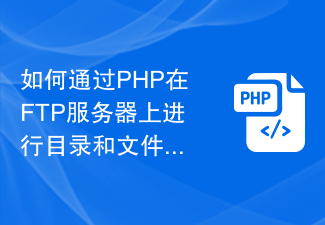 如何通过PHP在FTP服务器上进行目录和文件的比较Jul 28, 2023 pm 02:09 PM
如何通过PHP在FTP服务器上进行目录和文件的比较Jul 28, 2023 pm 02:09 PM如何通过PHP在FTP服务器上进行目录和文件的比较在web开发中,有时候我们需要比较本地文件与FTP服务器上的文件,以确保两者之间的一致性。PHP提供了一些函数和类来实现这个功能。本文将介绍如何使用PHP在FTP服务器上进行目录和文件的比较,并提供相关的代码示例。首先,我们需要连接到FTP服务器。PHP提供了ftp_connect()函数来建立与FTP服务器
 Go语言Web框架对比:gin vs. echo vs. irisJun 17, 2023 pm 07:44 PM
Go语言Web框架对比:gin vs. echo vs. irisJun 17, 2023 pm 07:44 PM随着Web开发的需求不断增加,各种语言的Web框架也逐渐多样化,Go语言也不例外。在许多Go语言的Web框架中,gin、echo和iris是三个最受欢迎的框架。在这篇文章中,我们将比较这三个框架的优缺点,以帮助您选择适合您的项目的框架。gingin是一个轻量级的Web框架,它具有高性能和灵活性的特点。它支持中间件和路由功能,这使得它非常适合构建RESTful
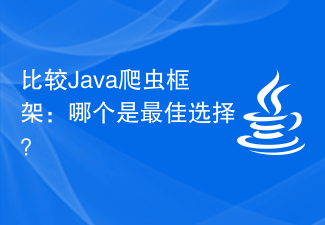 比较Java爬虫框架:哪个是最佳选择?Jan 09, 2024 am 11:58 AM
比较Java爬虫框架:哪个是最佳选择?Jan 09, 2024 am 11:58 AM探寻最佳Java爬虫框架:哪个更胜一筹?在当今信息时代,大量的数据在互联网中不断产生和更新。为了从海量数据中提取有用的信息,爬虫技术应运而生。而在爬虫技术中,Java作为一种强大且广泛应用的编程语言,拥有许多优秀的爬虫框架可供选择。本文将探寻几个常见的Java爬虫框架,并分析它们的特点和适用场景,最终找到最佳的一种。JsoupJsoup是一种非常受欢迎的Ja
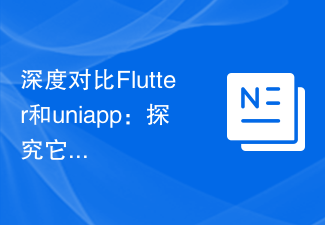 深度对比Flutter和uniapp:探究它们的异同和特点Dec 23, 2023 pm 02:16 PM
深度对比Flutter和uniapp:探究它们的异同和特点Dec 23, 2023 pm 02:16 PM在移动应用开发领域,Flutter和uniapp是两个备受关注的跨平台开发框架。它们的出现使得开发者能够快速且高效地开发同时支持多个平台的应用程序。然而,尽管它们有着相似的目标和用途,但在细节和特性方面存在一些差异。接下来,我们将深入比较Flutter和uniapp,并探讨它们各自的特点。Flutte是由Google推出的开源移动应用开发框架。Flutter
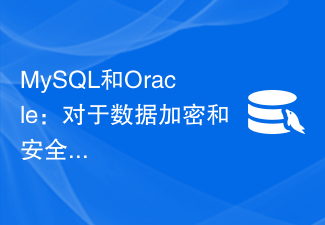 MySQL和Oracle:对于数据加密和安全传输的支持程度比较Jul 12, 2023 am 10:29 AM
MySQL和Oracle:对于数据加密和安全传输的支持程度比较Jul 12, 2023 am 10:29 AMMySQL和Oracle:对于数据加密和安全传输的支持程度比较引言:数据安全在如今的信息时代中变得愈发重要。从个人隐私到商业机密,保持数据的机密性和完整性对于任何组织来说都至关重要。在数据库管理系统(DBMS)中,MySQL和Oracle是两个最受欢迎的选项。在本文中,我们将比较MySQL和Oracle在数据加密和安全传输方面的支持程度,并提供一些代码示例。
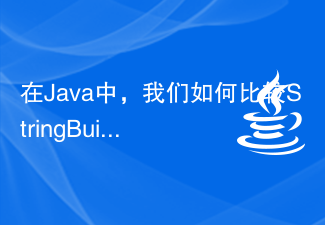 在Java中,我们如何比较StringBuilder和StringBuffer?Aug 28, 2023 pm 03:57 PM
在Java中,我们如何比较StringBuilder和StringBuffer?Aug 28, 2023 pm 03:57 PMStringBuffer对象通常可以安全地在多线程环境中使用,其中多个线程可能会尝试访问同一个StringBuffer对象同时。StringBuilder是线程安全的StringBuffer类的替代品,它的工作速度要快得多,因为它没有同步>方法。如果我们在单个线程中执行大量字符串操作,则使用此类可以提高性能。示例publicclassCompareBuilderwithBufferTest{ publicstaticvoidmain(String[]a
 C程序用于比较两个矩阵是否相等Aug 31, 2023 pm 01:13 PM
C程序用于比较两个矩阵是否相等Aug 31, 2023 pm 01:13 PM用户必须输入两个矩阵的顺序以及两个矩阵的元素。然后,比较这两个矩阵。如果矩阵元素和大小都相等,则表明两个矩阵相等。如果矩阵大小相等但元素相等不相等,则显示矩阵可以比较,但不相等。如果大小和元素不匹配,则显示矩阵无法比较。程序以下是C程序,用于比较两个矩阵是否相等-#include<stdio.h>#include<conio.h>main(){ intA[10][10],B[10][10]; in

Hot AI Tools

Undresser.AI Undress
AI-powered app for creating realistic nude photos

AI Clothes Remover
Online AI tool for removing clothes from photos.

Undress AI Tool
Undress images for free

Clothoff.io
AI clothes remover

AI Hentai Generator
Generate AI Hentai for free.

Hot Article

Hot Tools

SAP NetWeaver Server Adapter for Eclipse
Integrate Eclipse with SAP NetWeaver application server.

EditPlus Chinese cracked version
Small size, syntax highlighting, does not support code prompt function

MantisBT
Mantis is an easy-to-deploy web-based defect tracking tool designed to aid in product defect tracking. It requires PHP, MySQL and a web server. Check out our demo and hosting services.

SublimeText3 Linux new version
SublimeText3 Linux latest version

PhpStorm Mac version
The latest (2018.2.1) professional PHP integrated development tool




